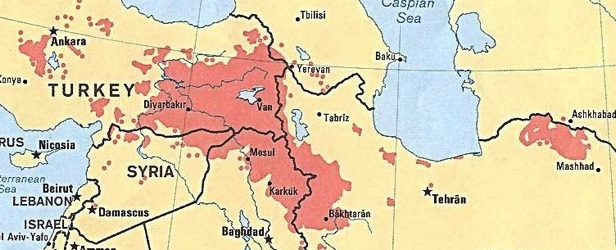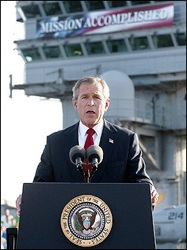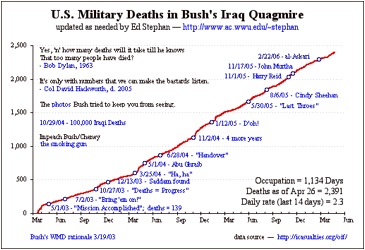
Dan Feidt's log on Minnesota, Information Operations, spinstorms and latent contradictions.
There are reports of trouble among the restive natives of eastern Anatolia. It seems the Yanks have tried to set up a banana republic down in Mesopotamia. in turn, the quiescent tribal locals of the north, who begrudge their Asian neighbors after many centuries of strife and imposed political submission to the Turk and the Arab, finally see a moment to cut their own path through the highlands.
The Kurds have broken loose of Baghdad's control, and more recently, have taken up arms in great numbers against their Ottoman masters in Constantinople. There's a sense they may yet capture the Kirkuk oil fields from Baghdad, and from there, face their destiny against the Turkish army to liberate their brethren.

Or something like that. (source: check out these maps of the Ottoman empire - thx Texas U!) In reality, any damn fool before the war would have said that Saddam's fall would lead to the Kurds seeking total independence and rebelling against Turkey, as they did in 1920, 1925, 1930, 1937, the 1980s, 1990s.... Apparently, this has escalated into ethnic conflict in Iraq, as the small Turkmen minority – about a quarter of Kirkuk – suffer the ethnic and religious tensions under Kurdish dominion in contemporary Iraq (not to mention getting the shit bombed out of them in Tal Afar). The Turks, meanwhile, will probably "step in" at some point to save their Turkic brethren from Kurdish "consolidation".
Of course, the Kurds have one of the most peculiar distributions of any ethnic group in the world:

This presents the possibility of Turkish military intervention into Iraq – and certainly, they have a presence there. Der Speigel reports:
 April 25: Kurdish Intifada? Clashes in Southeastern Turkey on the Rise
April 25: Kurdish Intifada? Clashes in Southeastern Turkey on the Rise
Violence is on the rise in southeastern Turkey as the Kurdistan Worker's Party increases its guerilla activity. The government in Ankara is worried about a Kurdish intifada.
It's slowly becoming a regular feature of the news coming out of Turkey these days: clashes between Turkish troops and Kurdish militants in the eastern part of the country. On Tuesday, three Kurdish militants and one Turkish soldier were killed in a skirmish in the Sirnak province near the Iraqi border. Fifteen soldiers, four police officers and more than 40 Kurdish militants have been killed in south-eastern Turkey in recent months. And eight bombings in the past three months have left two dead and 47 injured -- bombings claimed by a group calling itself the Kurdistan Freedom Falcons.
In short, violence is on the rise in Turkey -- and the country's military is concerned that the Kurdistan Workers' Party (PKK), together with the Kurdistan Freedom Falcons, is trying to begin a Palestinian-style intifada.
Indeed, the Aksam newspaper reported last Friday that a further 10,000 Turkish soldiers have been sent to the border region, bringing the total number of troops in the area up to about 50,000. "As long as the PKK exists, our operations will continue in ever-increasing intensity," General Yasar Buyukanit, the head of Turkey's land forces, told CNN-Turk television in an interview aired on Sunday.
The Kurdistan Workers' Party or PKK, which has been fighting for Kurdish autonomy since 1984, frequently launches its anti-government operations from its bases on the Iraqi side of the border. Since the group took up arms in 1984, some 37,000 people have lost their lives in the fighting -- with clashes generally accelerating in the spring time when the mountain passes on the Turkey-Iraq border become more accessible.
Indeed, to help prevent attacks from being launched across the border, some 2,000 Turkish soldiers are routinely stationed in northern Iraq. Turkey has repeatedly called on the United States to crack down on the PKK bases in northern Iraq, but US commanders have been reticent to divert troops from the struggle against Iraqi insurgents.
Now Turkey seems tempted to take matters into its own hands. The chief commander of Turkey's armed forces, General Hilmi Ozkok, has stressed that Turkey has the right to carry out cross-border operations under international law: "If the conditions arise, like every sovereign country, we will use those rights," Ozkok said on Sunday, according to the AP. Still, such a move would be politically sensitive and diplomats argue that it is unlikely Turkey will put its relations to Washington and to the European Union at risk by staging a large offensive in Iraq. Iraqi President Jalal Talabani has likewise recently said that neighboring countries should not meddle in Iraq's affairs -- a statement thought to refer to Turkey.
With the armed clashes between the PKK and the Turkish military heating up, the government of Turkish Prime Minister Recep Tayyip Erdogan is also stepping up internal repression of groups suspected of supporting the PKK. Last Tuesday, Turkish security forces raided the offices of the pro-Kurdish Democratic Society Party. Some 50 party members, including five provincial leaders and nine local leaders, were detained, according to the AP. Prime Minister Erdogan had previously urged members of the Democratic Society Party to denounce PKK violence. The leaders of the party have refused to accept the definition of the PKK as a terrorist group, a definition endorsed by Turkey, Washington and the EU.
Other Reporting: The ever-upbeat NY Times says: U.S. Will Help Turks Stop Kurdish Inroads From Iraq. AP: Turkey Deploys More Troops to Contain Kurdish Guerrillas. Juan Cole says:
Turkish military action against the Kurdish Workers' Party along the border with Iraq has heated up, with Turkish mortars falling on the Iraqi city of Zakho, according to this report. That's what we needed, more mortars falling on an Iraqi city from yet another quarter.
This problem is pretty damn obvious, I guess. It's yet another reason why the war in Iraq promised to go regional from day one. Oh wait. Three whole fucking years ago, tomorrow, we had this:

And two years ago, the list of the fallen was "only" this big. Charted today:

The regional war expands, we haven't even gotten to Iran yet, much less the eventually doomed oil terminals of Saudi Arabia...
Posted by HongPong at April 30, 2006 09:59 PM